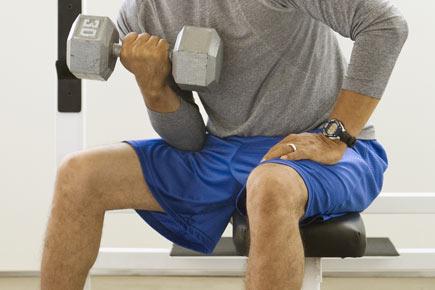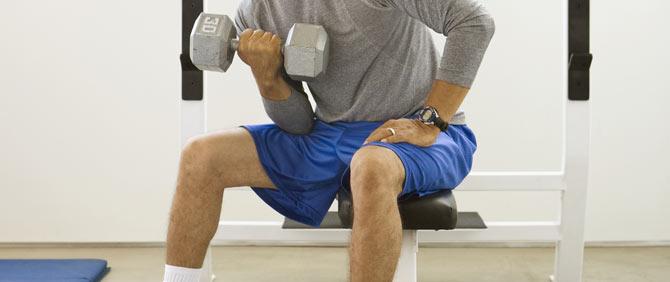Consultations are simply advice given by fitness professionals to their clients on how one can reach their goal

Helius D'Souza, Fitness tips

Representational picture
ADVERTISEMENT
Consultations are simply advice given by fitness professionals to their clients on how one can reach their goal. Fitness consultants at times charge big money for their advice especially when it comes to professional athletes. And most of these consultations are discreet.
Ever wondered what sort of discussions happens at fitness consultations? Well, this post is sneak-peek into that, while keeping the clients details a secret.
All rounder
I am a trainer, champion bodybuilder and power lifter. I represent the Indian National Team in Power Lifting, also I hold a National Record. There is one thing that I want to ask you, do cardiovascular exercises after intense weight lifting workout help shed fat?
I generally do cardio on alternate days which include 20 minutes walk on treadmill with highest inclination then followed by skipping about 500 times. Will this work or should I opt for another program, as I don't know what's happening with my body I'm very much worried. Can you please help me?
Reply from the coach: I do not recommend cardio after heavy intense weight training as this would lead to muscle loss. Your glycogen storage will be empty and it will tap into your protein for energy to sustain yourself. I would recommend you to do your cardio on separate days and follow a HIIT (High Intensity Interval Training) for about 20 minutes during your cardio session. As the sudden sprints will keep you in anaerobic mode this will be a more efficient way to burn fat as compared to a steady state of cardio for 20 minutes, which also will require a lot muscular endurance.
Skipping is also fine, but I do not recommend you to do more than 2 days of cardio as you spend the other days doing heavy weight training that is the best mode for fat loss. Cardio should only be done to increase cardiovascular endurance; the additional calorie burn is your bonus. I do not think walking for 20 min on an incline is such a great idea for a bodybuilder and is really not necessary.
Eat to train
Can you please guide me on how and when I must eat? I am a pure vegetarian and I don't even have eggs. I'm 5'8'' tall and 64 kg heavy. I have a little tummy (stubborn fat). What should I do to lose flabby tummy and how train my biceps and triceps. I don't see enough growth in them though I workout daily as per schedule and once a week I do cardio as well. Please guide me.
Reply from the coach: In order to have quality growth of muscles you need to follow this tripod - Progressive Overload, Nutrition and Recovery.
Progressive Overload means being able to lift weights that provide you enough resistance to create the break down of muscles. For a beginner the breakdown of muscles would be less, but in due time as you advance the muscle breakdown that took place with 12 to 15 reps will take place in 6 to 8 reps. As you'll be able to lift heavier and witness sufficient breakdown of your muscles.
Nutrition for fitness is like raw materials to a construction. Once there is breakdown of muscles after a workout, the body needs nutrition that is the fuel for the body. Nutrition for both pre-workout and post-workout are important to see good results and performance. Nutrition comes from sufficient amount of carbohydrates, protein and fats, which are all energy sources required by the body.
Recovery is what happens when you are resting and sleeping. Once the damage is done at the gym, and nutrition has been provided, the recovery takes place. Recovery is what repairs the body, so the body is prepared for the next time for any muscle breakdown at the gym.
The key to fat loss is to increase the level of your BMR, i.e. Basal Metabolic Rate - the rate at which you burn calories when you're body is at relative rest.
The two most efficient ways to increase BMR is to 1. Increase lean muscle: A person carrying more muscle will burn more fat than a person carrying less. 2. Eating small multiple meals: The more meals you eat the more the body has to work through the process of digestion and hence burn more calories.
Training bigger body parts in a compound manner will help burn more calories and see more breakdown of muscle. That will give the body more work to do in terms of repair.
Eating a diet conducive to fat loss will promote fat loss.
Train your triceps on your chest and shoulder day, and train your biceps on your back day.
Triceps: Close Grip Bench Press, Cable Press Downs
Biceps: Dumbbell Bicep Curls, Hammer Curls, Reverse Cable Curls.
Finally, every week give one-day rest for the body.
Confused Teen
I am 18 years old; it's been around 1 month since I joined the gym. I am a very thin guy and I want to bulk up a little. I'm very confused at this point. Different people are advising me different things. Some are advising me to take a 'mass gainer' and some are saying that it will bring fat to your body and I don't want to get fat. Most importantly some people are telling to go for 5-6 reps per set for gaining some are telling me to go for higher reps. Please do help me.
Reply from the coach: The main problem with a beginner is taking advice from many people. Most of the time it is advice from people who know nothing about the subject matter themselves. In India, you have any Tom, Dick and Harry giving you advice on any possible topic. I've myself seen housewives with not a gram of muscle advice young kids on how they should be developing muscles. However, the best people to take any advice from are certified professionals and for advice on health and fitness, do seek out certified fitness professionals.
Getting back, to put on muscles you'll have to invest time, make sure you let your body rest, recover and provide it with the necessary nutrition.
And this nutrition will depend on the intensity of your workout. Mass gainers are generally taken to bulk up, but that also depends on your body type, as there are different types of mass gainers. Putting on a little fat while bulking can and will happen, however in the name of bulking people tend to put on more than they require as they misunderstand the concept of bulking by consuming food from unwanted sources.
Do not be worried about the fat you put on for the next 3 years. These three years should be only about putting on muscle size. The information shared to you about the rep range is baseless and utter nonsense. Rep ranges have nothing to do with gaining or cutting. True rep maxes are done to determine intensity levels of weight training. As a beginner you should stick to a 12-15 rep max, at least till you improve and become an intermediate. Gaining and cutting is purely nutrition based.
Intense Regimes
I made a fitness plan for myself i.e. roughly an hour of swimming, followed by some exercises, then yoga and stretches, and finally some meditation. Totally it should take about 2-3 hours.
I am 20 years old, and have 0 fitness experience. I'm just getting started, is it a good plan? What do you recommend for nutrition? And, I also want to do some sprints in the evening. Please help.
Reply from the coach: Glad to see so much of dedication for your health and fitness, I hope you keep doing this for as long as you can.
Getting to your query, for someone who has zero fitness experience you are over training and wearing yourself out. 2-3 hours of intense physical activity is way too much, especially if by chance your recovery and nutrition is not in place. As you asked me about nutrition, I am assuming your nutrition is not spot-on.
When you say exercise, I take it you are talking about either body weight training or resistance weight training. Swimming is a full body workout and works on both - muscular and cardiovascular endurance, it is a lot of effort by itself and then going ahead with extra exercise is pushing it a lot.
I would suggest you keep swimming on different days, and keep your gym exercises on other days. Yoga however is relaxing and very good for the mind and body; hence you can do it at any time. But, best done post workout.
Regarding nutrition, if you are into as much as physical activity as you described, them make sure not to restrict your calories, but ensure your calories are coming from the right sources. When it comes to protein choose 1st class over 2nd class for muscle building. Carbohydrates would be best if chosen complex over simple, and fats both saturated and unsaturated are great. All your meals should have a good ratio of these three macronutrients.
 Subscribe today by clicking the link and stay updated with the latest news!" Click here!
Subscribe today by clicking the link and stay updated with the latest news!" Click here!






